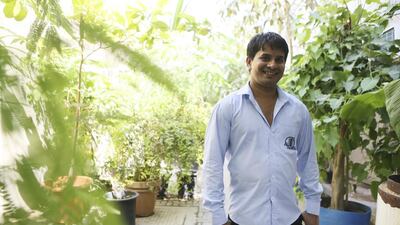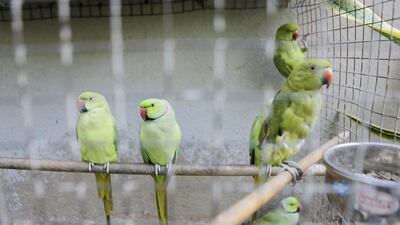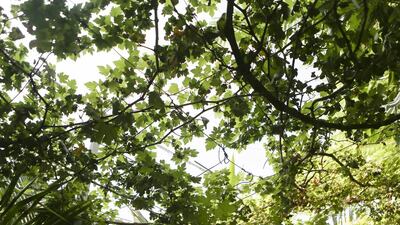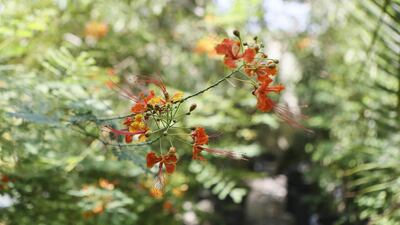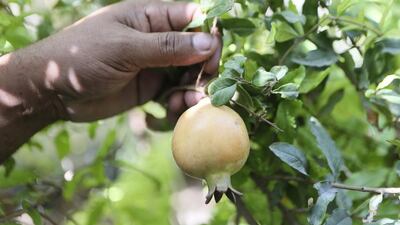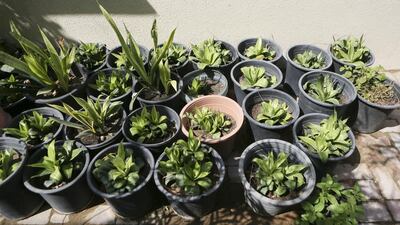An oasis is defined as "a fertile or green spot in the desert where water may be found" — but also signifies a place of peace or refuge. Perhaps surprisingly, one such spot can be found in the industrial heartland of Al Quoz 2 in Dubai, where a camp manager, known simply as Mr Rajeev, founded a garden at Al Showaib Real Estate's Farhan Camp about four years ago.
Worker accommodation is functional by design, yet the planting at Farhan Camp, where more than 5,000 men from countries such as India, Pakistan, the Philippines, Bangladesh and parts of Africa live while they work in the UAE, has breathed life and humanity into its surroundings, and has enhanced the standard of living of those who live here. The site is one of three managed by Al Showaib Real Estate where there are now thriving gardens.
Ifzuraham Abdulrashid, a supervisor at the Farhan Camp, came to the UAE from India a decade ago, and initially worked for a pool and landscaping company in Dubai’s Emirates Hills community, before taking on his current role. He took on day-to-day responsibility for caring for the garden, alongside his other duties. However, over time, other colleagues and friends have contributed their spare time and new plants to support the garden’s maintenance and expansion.
It’s now a true community project, and residents are proud to show us around and identify some of the trees and plants that grow here. These include established pomegranate, coconut, banana, date and mango trees, as well as an abundance of shrubs, succulents and flowering plants. I’m also shown a small nursery where plants are being propagated, with pots of mother-in-law’s tongue (Sansevieria trifasciata) in differing stages of growth. Old tyres, water tanks sawn in half, paint pots and buckets have been repurposed as planters to allow for the greening of the hard landscaping.
When I arrive at the camp, the sun is streaming through the various plants growing up and around the buildings. A flowering species of lilac Convolvulaceae drapes itself around many of the structures lining the main street, and beds have been planted with canna lilies, bougainvillea, palms and other shrubs. The landscape immediately appears softer, and more inviting, as a result. The cumulative effect is striking and transformative, and the abundant greenery has attracted numerous birds to the area.
Abdulrashid explains how he covered some of the more-fragile plant specimens during the summer, but has opened the heart of the garden now the weather is cooling. Stand at its centre, and you’re immersed in a fragrant and colourful oasis.
Grapevines trail from an overhead trellis, and green parakeets and pigeons flutter in aviaries to one side. The menagerie also includes an area for a tortoise, a pet guinea fowl, a tank of impressively sized koi, as well as a large, unidentified fish in an aerated bathtub. The parakeets are all descendants of an original breeding pair, so I question how a green parakeet had found himself in among the pigeons. “Fighting” is the response, but all seems to be calm now.
Sudheer Madhevan manages the worker accommodation from the head office of Al Showaib Real Estate, and tells me: “After the camp manager, Mr Rajeev, started the garden, we then began to assist him in keeping it clean and neat; Mr Mohammed Rashid, owner of the real-estate [company], is supporting this initiative, and the company makes a contribution for the maintenance of the landscaping.”
The company receives countless enquiries from organisations interested in securing accommodation for workers, and its sites are currently running at capacity, with no further rooms available. It would seem that this seed capital has brought not only greater harmony for the workers, but has also been a sound business decision that has enhanced demand for accommodation at the site.
“I think that because [the workers] collaborate, and their environment and the facilities are good, that this is good for their health and they will be happy; this is reflected everywhere and there is efficiency in working,” adds Madhevan.
This is a point illustrated by recent studies undertaken by the British universities of Westminister and Essex, and published in the Journal of Public Health. It found that tending a garden or an allotment is good for mental health. According to the study, "as little as 30 minutes a week tending plants can boost feelings of self-esteem and mood by dissolving tension, depression and anger". These benefits were found to be consistent across all social classes. It was also reported that those who worked on these garden projects found that it supported social interaction and feelings of community cohesion.
Carly Wood, a sports-and-exercise scientist at Essex University, has stated that this kind of community gardening could potentially contribute towards a greener and healthier economy, with significant benefits for public health. “This preventive approach could result in substantial savings to the UK economy, particularly in the treatment of health conditions, such as mental illness, obesity, cardiovascular disease and loneliness.” Wood has made recommendations to policymakers in Britain that they should consider gardens and gardening as a way of combating ill health.
A further study, published earlier this year and featured recently in The New York Times, also shows that connecting with nature is beneficial to mental health and can lower stress hormones. Gregory Bratman, a graduate student at the Emmett Interdisciplinary Programme in Environment and Resources at Stanford University, examined the psychological effects of urban living, and found that volunteers who strolled along leafy tree-lined areas (as compared to those who had merely walked along the roadside) exhibited less activity in the part of the brain known as the subgenual prefrontal cortex, the part associated with rumination and brooding.
Back in Al Quoz, camp residents have taken to relaxing among the flourishing greenery during their time off, and as the garden has grown, so too has its fame, as more plants — and the occasional fish — are brought to Abdulrashid, to add to the collection.
Amraiz Haider, a Pakistani security guard at the camp, tells me that a large part of their strategy had been to “plant them and see what happens”. In so doing, it would seem that cross-cultural collaboration, friendships, harmony and a greater sense of well-being are flourishing in among the many plants and birds of Al Showaib Real Estate’s Farhan Camp.
weekend@thenational.ae
